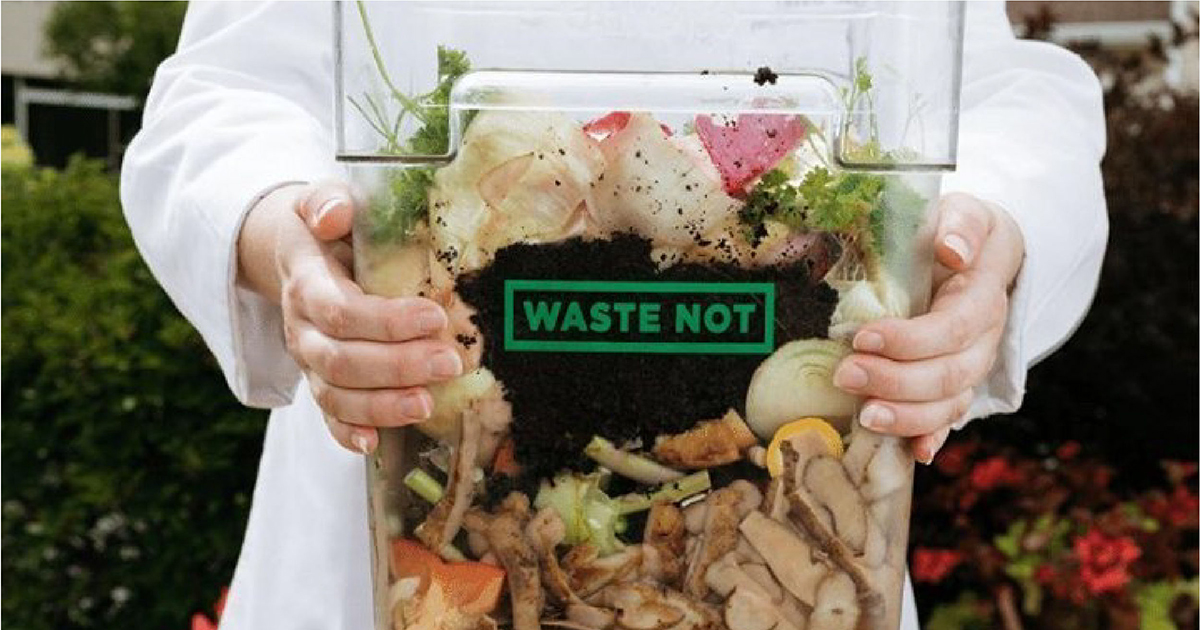Waste Not™ Inspires Chefs to Fight Food Waste

Chef-driven app created to significantly change kitchen culture and achieve waste reductions
REDWOOD CITY, Calif. (July 13, 2021) — A recognized leader in the food service industry for its environmental commitments, Bon Appétit Management Company has launched Waste Not™ — a patent-pending app and system for tracking and understanding food waste. Designed to help chefs and culinary teams shift their behavior to prevent future waste, the system goes beyond simply measuring waste quantities to get to the heart of the sources and actions that created waste in the first place. Bon Appétit designed and built the chef-centric system with in-house waste experts and culinarians, and an external development team.
The Waste Not system puts data-entry tablets back-of-house and asks chefs and culinary teams to report their food waste using words that are easily understood (like “Odds and Ends”). The app captures real-time information about the quantity, cause, and destination of food waste conveniently, without using a scale. The waste-tracking process is easily integrated into the day-to-day flow of operations in a busy restaurant kitchen: entries take cooks as little as 15 seconds to make.
“Waste Not is changing the way our employees see, understand, and talk about food waste,” says Claire Cummings Bogle, Bon Appétit’s waste programs manager and an inventor on Waste Not’s patent application. “When it’s everyone’s job to track food waste, it becomes everyone’s job to prevent it. Already we’re seeing better communication and collaboration on preventing and reducing food waste in our kitchens.”
Waste Not provides intuitive and thoughtful visual cues that help change behavior as kitchen staff report waste throughout the day. Waste that is considered unavoidable like trim, bones, and shells is color-coded green, while food that goes to waste because it was overproduced or expired (and thus may have been preventable) is color-coded red. When teams report the destination of their waste, they select the relevant section of the EPA Food Recovery Hierarchy, offering a helpful reminder that it is always preferred to feed people and animals over composting.
“When creating Waste Not we focused on giving chefs the data they need to understand the problem and kitchen staff a way to report and talk about what is happening, whether that’s overproduction, excess trim waste, or something else,” explains Bogle.
“Bon Appétit is at the forefront of what’s working in fighting food waste,” says Dana Gunders, Executive Director of ReFED, a nonprofit dedicated to ending food loss and waste with data-driven solutions. “Waste Not makes it easy for users to understand why waste is happening and to make impactful changes to prevent it.”
All of the data captured through Waste Not is rolled up to Bon Appétit’s Café Manager system, a proprietary menu and data tracking program, which boasts its own Waste Not analytics page. There, café-, campus-, and region-level waste data is presented in a way that helps chefs see opportunities to prevent and reduce waste and allows them to easily share reports with clients and guests. Chefs can pull stats on how much excess food has been donated and how their numbers have changed over time. Using ReFED’s Insights Engine data hub, a visualization on Waste Not’s analytics page displays the water and carbon footprint of the waste. The visualization provides relative stats to help contextualize its impact, such as equivalence to the emissions of a certain number of vehicles on the road per year and the amount of water wasted in the form of Olympic-sized swimming pools.

Following pilot programs, Waste Not is now rolling out across the country and is also being translated into Spanish and French. Bon Appétit’s parent-company, Compass Group, adopted Waste Not for its other sectors and is using the program to fight waste in healthcare, college, and corporate settings. The system is also an important part of Bon Appétit’s commitment to reducing its waste by 50% by 2030 as one of the EPA’s U.S. Food Loss and Waste 2030 Champions and the company’s recently announced commitment to reducing greenhouse gas emissions by 38%, per calorie of food, by 2030.
Claire Cummings Bogle is available for interviews. Imagery of the Waste Not analytics page and program in action is available.
###
About Bon Appétit Management Company
Bon Appétit Management Company (www.bamco.com) is an on-site restaurant company based in Redwood City, Calif. that operates cafés in 33 states for corporations, universities, and cultural institutions, including Twitter, Chase Center (home of the Golden State Warriors), Oracle Park (home of the San Francisco Giants), University of Pennsylvania, Case Western Reserve University, and many others. Bon Appétit chefs create unique menus and cook from scratch, including sauces, stocks, and soups at every location. “Food service for a sustainable future” is the heart of Bon Appétit’s business philosophy and the company is a recognized industry leader in environmentally and socially responsible practices, with awards from organizations including the Sustainable Purchasing Leadership Council, Acterra, James Beard Foundation, and many others.
Contact:
Jenny Slafkosky, Director of Communications
Peter Todaro, Communications and Content Specialist
pr@www.bamco.com
Jodie Chase, Chase, Ink. Public Relations
jodie@chase-ink.com